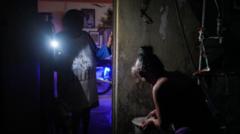Much of Cuba is without power on Sunday as Hurricane Oscar approaches, two days after the country’s main energy plant failed and knocked out power to 10 million people.
Electricity supply was partially restored on Saturday, before collapsing again overnight.
President Miguel Diaz-Canel said that authorities in the east of the island were “working hard to protect the people and economic resources, given the imminent arrival of Hurricane Oscar”.
Packing 85mph (140km/h) winds, Oscar is forecast to reach Cuba on Sunday afternoon local time, and could cause flash-flooding and mudslides in eastern areas, according to the US National Hurricane Center.
For many people it has been a few days with no air conditioning or fan. Food is now beginning to rot in fridges, and some families are having to cook with firewood. Many homes are without water as the supply depends on electric pumps.
Patience is wearing thin, certainly as expressed by many on social media – but there are no reliable reports of protests as yet.
It is an increasingly critical situation, with schools and businesses closed and fears for the continued functioning of hospitals.
There are fears that a significant storm would damage Cuba’s creaking energy distribution infrastructure.
Friday’s total blackout came after the Antonio Guiteras power plant in Matanzas – the largest on the island – went offline around 11:00 local time.
President Díaz-Canel said the situation was his “absolute priority”.
“There will be no rest until power is restored,” he wrote on X.
The communist president has blamed the decades-long US embargo for preventing much needed supplies and replacement parts from reaching Cuba.
Cuban Foreign Minister Bruno Rodríguez later echoed his words, saying that damages in just 18 days of the embargo equated to the annual cost of maintaining the national power grid.
“If the embargo is lifted, there will be no blackouts. This way the US government could support the Cuban people… if it wanted to,” the minister wrote in a post on X.
Cuba has also been hit this year by a drop in crucial fuel shipments from Venezuela.
On Friday, Cuban officials announced that all schools and non-essential activities, including nightclubs, were to close until Monday.
Non-essential workers were urged to stay home to safeguard electricity supply, and non-vital government services were suspended.
“This is crazy,” Eloy Fon, an 80-year-old pensioner living in central Havana, told the AFP news agency.
“It shows the fragility of our electricity system… We have no reserves, there is nothing to sustain the country, we are living day to day.”
Bárbara López, 47, a digital content creator, said she had already “barely been able to work for two days”.
“It’s the worst I’ve seen in 47 years,” she said. “They’ve really messed up now… We have no power or mobile data.”
Prime Minister Manuel Marrero addressed the public in a televised message on Thursday, blaming deteriorating infrastructure, fuel shortages and rising demand for the electricity failures.
“The fuel shortage is the biggest factor,” he said.
The head of the National Electric Union (UNE) Alfredo López Valdés also acknowledged the island had been facing a challenging energy situation, with shortages chiefly to blame.
Prime Minister Manuel Marrero addressed the public in a televised message on Thursday, blaming deteriorating infrastructure, fuel shortages and rising demand for the electricity failures.
“The fuel shortage is the biggest factor,” he said.
The head of the National Electric Union (UNE) Alfredo López Valdés also acknowledged the island had been facing a challenging energy situation, with shortages chiefly to blame.
Extended blackouts – particularly one this widespread – are always a tense time in Cuba.
In part, because the ability to keep the lights on represents a potential public order issue for the Cuban government.
In July 2021, thousands of protesters spilled into the streets in demonstrations sparked by days-long blackouts in much of the country.
The Cuban government has become increasingly aware that many on the island have lost a degree of fear over speaking out about the many daily problems they face.
Some are even prepared to take to the streets and chant anti-government slogans, if conditions merit it.
In March, Hundreds of people in Cuba’s second-largest city, Santiago, staged a rare public protest over chronic power blackouts and food shortages.

